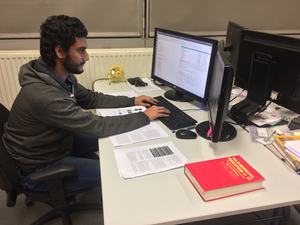Winner of the Eiffel Scholarship, Romel Bhattacharjee came to spend 10 months in France to carry out his research in the ICube laboratory of the University of Strasbourg. The only doctoral student at the university to benefit from the scheme, this biomedical engineering specialist intends to make the most of this exchange, which could lead to a much longer collaboration.
Since 2015 Romel Bhattacharjee has been preparing a thesis at the School of Biomedical Engineering at the Indian Institute of Technology (IIT-BHU) in Varanasi, one of the country's centres of excellence in the engineering sciences. His subject? Deformable registration (understanding image matching) and the fusion of 3D images coming from different methods in medical imaging (MRI, scanner, ultrasound, etc.)
"The purpose of this work is to eradicate existing problems by developing faster non-rigid algorithms using deep learning techniques based on convolutional neural networks (CNNs), able to record and merge images with minimal error. This will lead to the future design of assistive devices for image-guided surgery". A demanding subject, which despite much work since the 1990s, raises unresolved scientific barriers in situations encountered in clinical conditions.
International cooperation
In search of an international scheme to study abroad, the young man discovered the Eiffel programme. "I then looked for a laboratory in my field and discovered the ICube images, modelling, learning, geometry and statistics research team. I had already been to France, to Paris, and I had enjoyed the culture of the country", says the 27 year-old doctoral student, in fluent English, and he decided to try his luck.
Knowing the excellence and selectivity of IITs in India, Fabrice Heitz, deputy director of the ICube laboratory, did not take long to agree to co-direct the young man's thesis work. An application in line with the activities of the team of the recognised laboratory in the field of medical image registration, which it has been working on for more than 20 years and which will make it possible to engage in sustainable international collaboration with the IIT of Varanasi.
Different techniques
Arriving in France last September, Romel Bhattacharjee thus accessed imaging techniques that were different from those used in India. "What I also appreciate is that here, in laboratories, there are more layers with assistants, researchers, research engineers ... we can talk more directly with people about their subject. In India, there is just our tutor who does their best to give us time in addition to their academic and pedagogical work."
Another change: "In France, with the Eiffel programme, I have more time to invest in my project. In India, I had to work 8 hours a week to accompany other students", said the doctoral student who discovered on arrival a completely different urban environment, quieter and with far less dense traffic. Romel Bhattacharjee is expected to stay in Strasbourg until July, but is already thinking about returning to do a post-doctorate. In the meantime, the young man plans to follow a programme to learn French.
Marion Riegert
The Eiffel Scholarship in brief
Good to know
Managed by Campus France and developed by the Ministry of Europe and Foreign Affairs, the Eiffel Excellence Scholarship Programme enables French higher education institutions to attract the cream of foreign students to master's and PhD programmes. Without forgetting to train future foreign decision-makers, from the private and public sectors, in priority areas of study, and to stimulate applications from students from emerging countries up to 30 years old for the master's level and from emerging and industrialised countries aged up to 35 years old for the PhD level. All, in the field of law, of the engineering sciences, economics and management and political sciences. Approximately 50 applications are selected each year at a national level.
In Strasbourg, the Eiffel PhD scholarships are managed by the International Centre of the Doctoral College and the Eiffel Master Scholarships by the International Relations Department. This year, one student was welcomed in each level. The call for applications for the programme for the 2019/2020 academic year was launched last October.
















